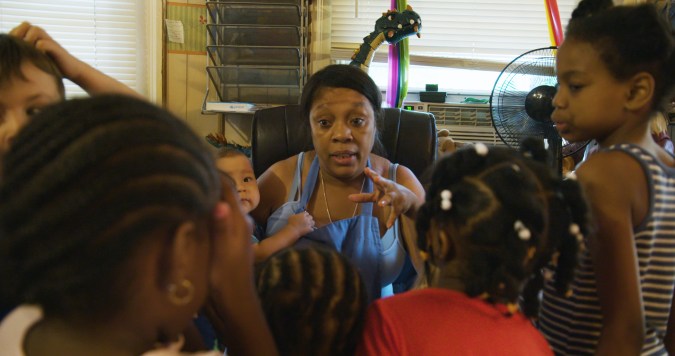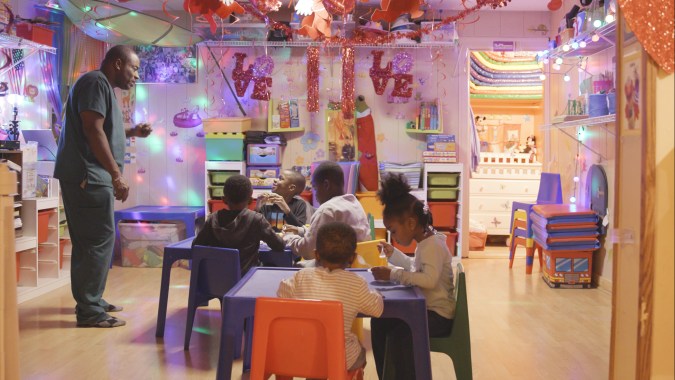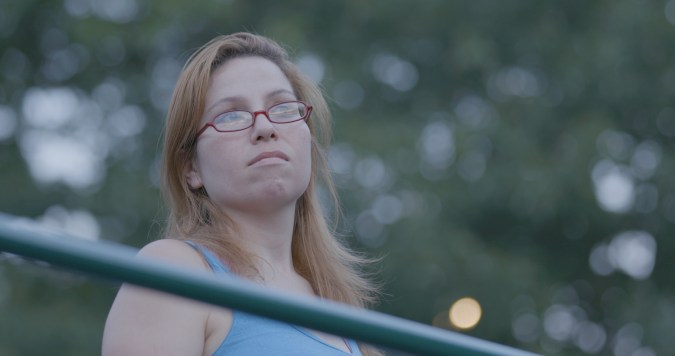The women who filmmaker Loira Limbal intimately portrays in her empathetic documentary Through the Night have always been familiar to her. In the film, the artist captures the comings and goings of a 24-hour child care center that proves essential for single mothers working the night shift.
Growing up in the Bronx, Limbal’s Dominican mother, Luz, was one of those women. Raising four daughters on her own in the ‘80s, her mother, like the mothers featured in the film, had to depend on others to watch her children while she worked low-wage jobs just to keep the family afloat.
“Life was full of love, but we also had our fair share of hardships,” Limbal tells Remezcla. “I stayed at daycare centers and I also stayed with vecinas (neighbors). I was taken care of by a lot of different people throughout the years.”
In Through the Night, Limbal, a first-time feature director, centers the narrative on Dee’s Tots Daycare in New Rochelle, New York, run by Deloris “Nunu” Hogan, who has been providing day and overnight care for children for more than two decades. Without Hogan’s help, most of the mothers who work nonstandard hours and depend on the center would have nowhere else to go.
As a single mother herself, Limbal is thankful she doesn’t have to make the same difficult decisions as her mom when it comes to finding suitable child care. She recognizes her mother was given “impossible options.”
“My mother didn’t work the kinds of jobs where she could call in sick if she had a child care issue,” Limbal explains. “That meant she had to patch stuff together and do things that were really far from ideal and that nobody really wants to do.”
It’s a real testament to how we live our lives in our communities that is not often depicted.
Through the Night shows that the impossible decisions single mothers are forced to make haven’t changed much since Limbal was a child. The U.S. is suffering from a child care crisis. According to a report from the Council for a Strong America, the impact of the nation’s child care crisis on working parents, employers, and taxpayers translates into a loss of $57 billion in earnings, productivity and revenue per year.

This year, COVID-19 has exacerbated the problem. According to the Washington Post, more than 250,000 child care workers have lost their jobs due to the pandemic. Without a national social response, Limbal says “everyone is left to fend for themselves.”
“The way the labor force is set up in the U.S., no one really cares,” Limbal says. “[Child care workers] are essential, but they are provided with very little support. When I’m at the supermarket, I think about the cashier and whether she has children and where they are since schools and daycares are closed. There is no safety net for working families.”
There is also no contingency plan for child care workers—most of them women of color and immigrant women working in the U.S. In one scene in Through the Night, one of the mothers, Marisol Valencia, who leaves her children at Dee’s Tots Daycare, goes to interview for a job as a child care worker—for $11 an hour.

“It’s such low-paid work and work that is disregarded, dismissed and disrespected,” Limbal says. “For many, it’s two sides of the same coin. The women who need the care for their children are part of the same community as the women who provide the care. And everyone is overworked and underpaid. I wanted to expose the cruelty and injustice in that.”
At the same time, Limbal says, because the communities intersect, there is a lot of “love and tenderness” shared between the women because they each know what the other is going through daily.
“There is something beautiful in that,” Limbal shares. “It’s a real testament to how we live our lives in our communities that is not often depicted. We’re still here despite all the things we are up against. It’s because of the caregivers. We value each other’s lives and give that to each other in the face of so many structural and social injustices.”

When she reflects on her upbringing today, Limbal wishes her mother had a place like Dee’s Tots Daycare where she could get the child care she needed, but also the emotional support that Hogan gives to all the women who come through her door.
We’re still here despite all the things we are up against.
“Nunu embodies the idea that mothers need to be mothered,” Limbal explains. “It runs counter to the idea in our culture that as a mother you’re supposed to solve everything yourself. It certainly resonates with me as a single parent.”
Through the Night is available on virtual cinemas from Dec. 11-24. You can purchase tickets here.




